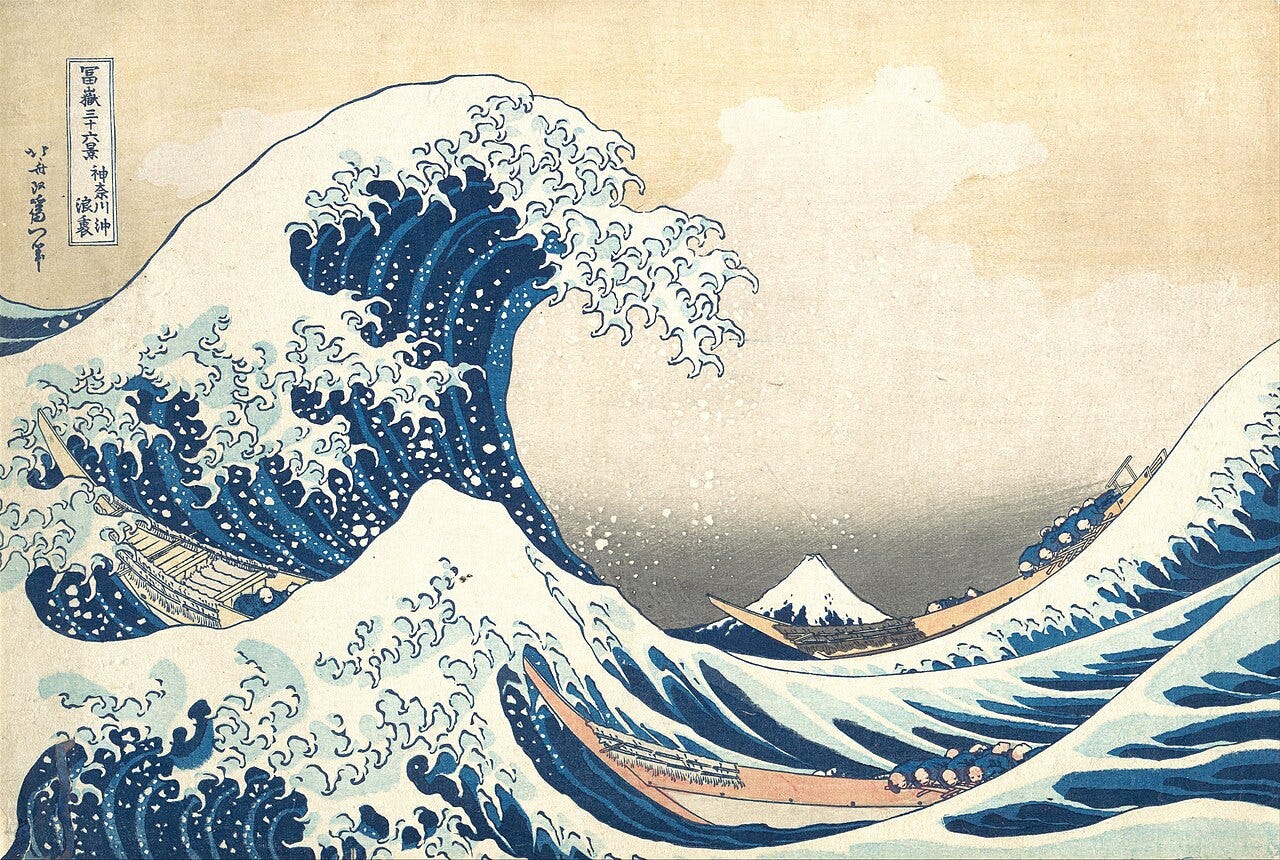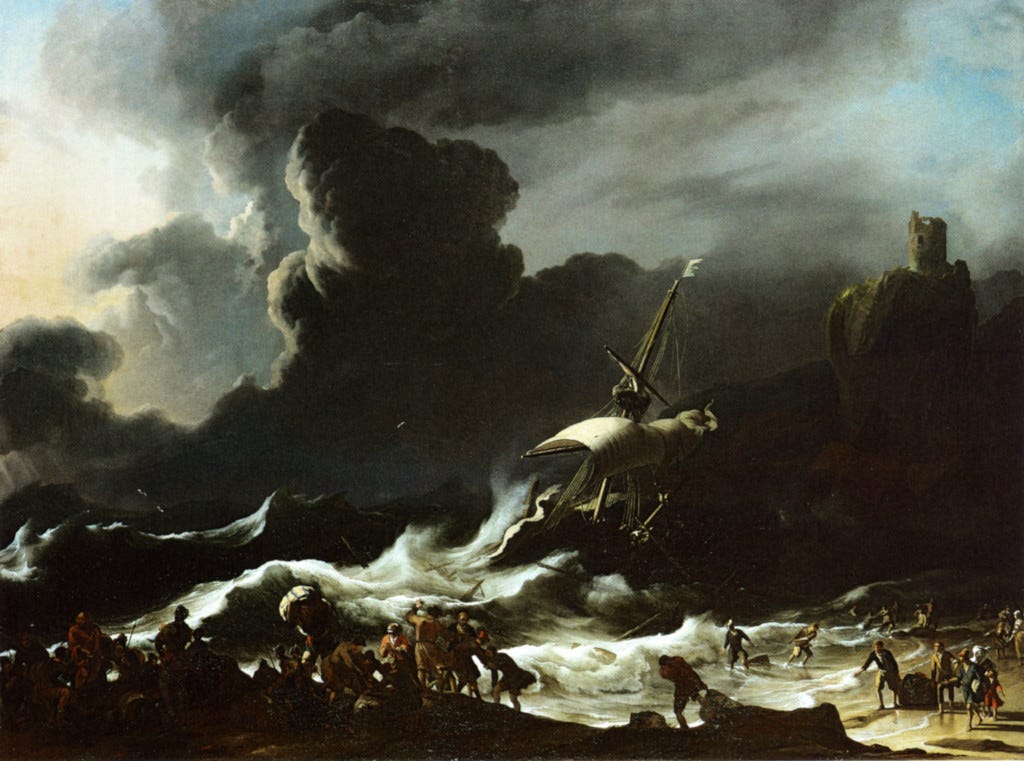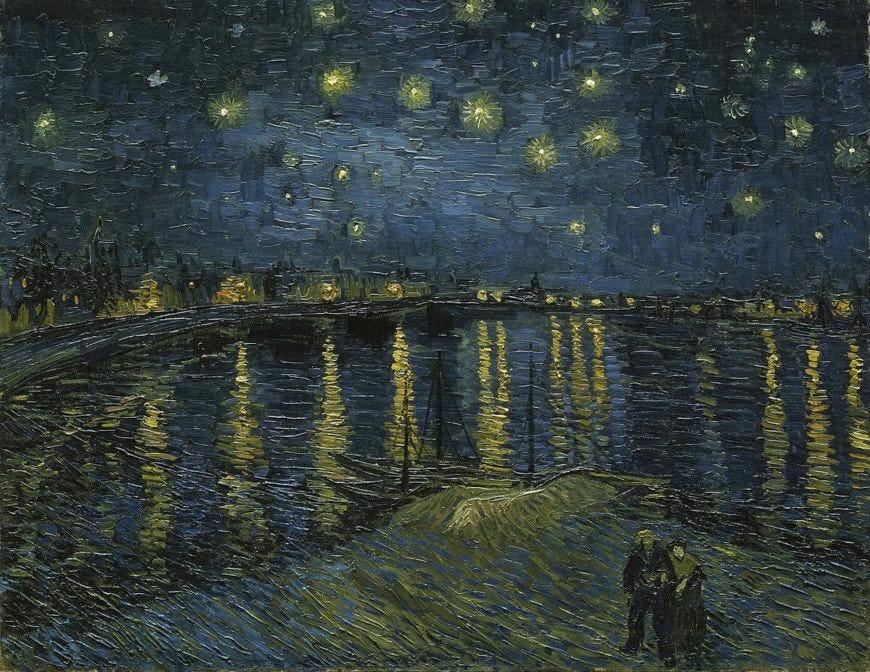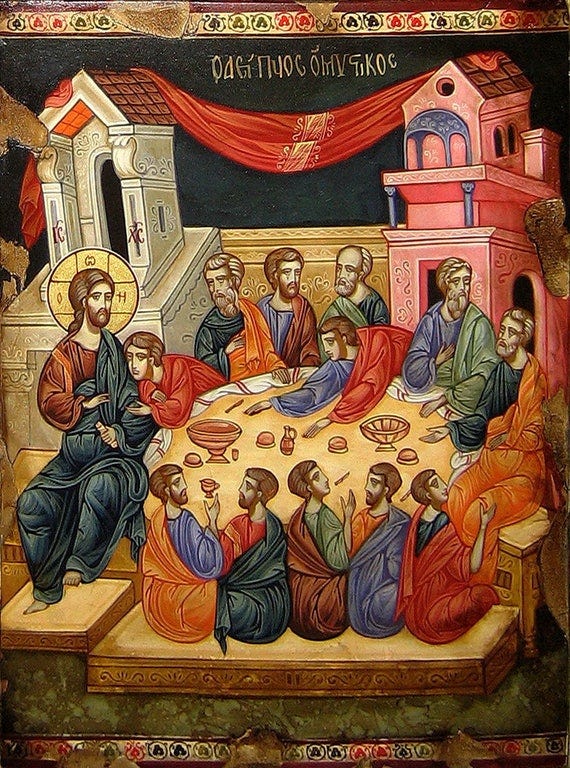Daily Readings | 28 Feb 25 | Natural Analogies & the Love Feast in Jude
Scripture Readings: Zech 8:7–23
Saint/Feast Day: St. Basil, Venerable-Confessor
St. Basil lived in the eighth century, and became a monk in his youth, under the direction of St. Procopius (feast day February 27). Like his mentor Procopius, Basil refused the Imperial decree banning icons during the iconoclastic struggle against the Church. For this he was arrested and tortured, suffering especially wounds to his face. Despite these trials, his constancy was unshakable. After the death of the Emperor, he was released with other confessors and continued his life of ascetic holiness. He died in peace.
L. Farley, Eastern Saints
Readings: Zech 8:7–23
Since today’s readings are only for the OT and this is an NT SubStack, I thought I would use this as an excuse to continue our discussion of Jude.
If you haven’t already, it might be good to read the first and the second Daily Readings on this epistle.
As we continue in Jude, v. 12–13 could be another lengthy post because there is a lot here to dissect:
These are [a reef (σπιλάδες)] in your love feasts, as they boldly [feast (συνευωχούμενοι)] together, looking after themselves; waterless clouds, carried along by winds; fruitless trees in late autumn, twice dead, uprooted; |13| wild waves of the sea, casting up the foam of their own shame; wandering stars for whom the nether gloom of darkness has been reserved for ever.
Rocky Reefs or Blemishes?
First, there is dispute on how to render σπιλάδες, spilades, “reef.” RSV contains “blemishes” and others take this as a “stain” on the community. Problematically, this seems to be influenced by 2 Peter 2:12–13, which very well might be dependent on this verse:
|12| But these, like irrational animals, creatures of instinct, born to be caught and killed, reviling in matters of which they are ignorant, will be destroyed in the same destruction with them, |13| suffering wrong for their wrongdoing. They count it pleasure to revel in the daytime. They are blots and blemishes (σπίλοι καὶ μῶμοι), reveling in their dissipation, [feasting (συνευωχούμενοι)] with you.
The two words are nearly identical—σπιλάδες and σπίλοι—but they are not the same word; additionally, the first (in Jude) is feminine and the second (in 2 Peter) is masculine.
Jude also enjoys employing vivid imagery,—12b–13—so it seems more natural that a shipwreck type metaphor—that is, the natural dangers of sailing—is in mind. The analogies from nature that follow seem to solidify this, especially since the author has transitioned from judgment and condemnation for wrongdoing in Jewish history. The flow of the text also makes more sense. As he just detailed three illustration once (5–7) and then three again (11),—with another intervening image (10)—the repeated analogies from creation follow the pattern:
Reef
Waterless Clouds
Fruitless Trees
Wild Waves
Wandering Stars
To go from a natural occurring impediment to a list of 4 other examples makes far more analogical sense than starting with a vague appeal to “blemish” or “stain” and then transitioning to nature.
More importantly, though, what is the significance?
Just like the OT examples were illustrations of bad behavior and the consequences that resulted from such actions, now the “godless” persons are compared to natural occurrences that can lead to destruction.
A Reef—ships, unable to see a reef, could crash into them and sink.
Waterless Clouds—a useless natural occurrence; for, without water, what good is a cloud for crops? (Compare with Prov 25:14 [Hebrew])
Fruitless Trees—Akin to waterless clouds, if you bear no fruit, what good is a tree? (Compare with Jesus and the fig tree [Mark 11:12–14]; bad trees are chopped down [Matt 3:10])
Wild Waves—a dangerous natural phenomenon that causes disorder and possible shipwrecks. (Compare Isa 57:20 [Hebrew]; Wis 14:1)
Wandering Stars—in ancient cosmology, the universe (kosmos) is meant to be ordered (a full discussion is too long for here; I have written on this briefly, but more in connection with household codes).1 So, to wander aimlessly as stars would be negative, and could impede proper navigation while at sea, leading to shipwreck. (Compare, perhaps, 1 Enoch 18:13–16; 21:3–6—possibly falling stars in Isa 14:12–15; similar to Rev 8:10; 9:1)
Are these examples meant to point to specific transgressions of those who have infiltrated the Agape Meal? No, I do not believe so. Rather, it is a general comment on those who have corrupted the Church through their vile behavior and wicked teachings.
It is a condemnation through vivid imagery to illustrate the destruction that can ensue should they be followed:
They are a reef—hidden and dangerous—that can lead to destruction.
They are clouds that may look promising to water your crops and provide good food, but in reality they offer nothing to help you grow.
They are fruitless trees that bear no sustenance. They are good for nothing and offer nothing nutritious.
They are waves that crash and cause turmoil, producing filth that only stains.
They are stars with no path, which will mislead and guide you towards oblivion.2
The natural analogies would resonate with the audience perfectly. They are further illustrations from creation that show how those “godless” ones who deny the Lordship of Christ and squander their gift of grace can defile an entire community.
The Love Feast: The Lord’s Supper? The Eucharist?
This is the earliest attestation where this meal is described with the word love (ἀγάπαις, agapais). In Paul, this meal is greatly discussed in 1 Corinthians, where he calls it the Lord’s Supper:
|20| When you meet together, it is not the Lord’s supper that you eat. |21| For in eating, each one goes ahead with his own meal, and one is hungry and another is drunk. |22| What! Do you not have houses to eat and drink in? Or do you despise the church of God and humiliate those who have nothing? What shall I say to you? Shall I commend you in this? No, I will not. (1 Cor 11:20–23)
He discusses the meal more at length in 1 Cor 10:16–17 and 11:23–26.
As for other documentation in the NT, there is a clear reference in Luke when Jesus appears to two disciples (24:30–31)—it is at the breaking of bread (while they recline at table) that Jesus is revealed.
We then see this practice in the Early Church:
|42| And they devoted themselves to the apostles’ teaching and fellowship, to the breaking of bread and the prayers… |46| And day by day, attending the temple together and breaking bread in their homes, they partook of food with glad and generous hearts, |47| praising God and having favor with all the people. And the Lord added to their number day by day those who were being saved. (Acts 2:42, 46–47)
The Eucharist was incorporated with a meal in our earliest attestations.
As for the meal being called a “Love Feast,” there is a variant reading in 2 Peter 2:13
reveling in their <love feasts (αγαπαις αυτων)>, [feasting (συνευωχούμενοι)] with you.
This shows that since 2 Peter seems heavily reliant on Jude in places. This mistake is natural, and it is not confusing to see how it could have arisen in the transmission and copying of the text.
As for others in the Early Church, there is some variety.
In the Didache, it is called the Eucharist:
Now concerning the Eucharist, give thanks thus: First, concerning the cup: “We give Thee thanks, our Father, for the holy vine of David Thy servant…” And concerning the broken bread: “We give Thee thanks, our Father, for the life and knowledge which Thou didst make known to us through Jesus Thy servant…” (Didache 9)
Ignatius of Antioch (2c.) connects the two:
Let that be deemed a proper Eucharist, which is [administered] either by the bishop, or by one to whom he has entrusted it. Wherever the bishop shall appear, there let the multitude [of the people] also be; even as, wherever Jesus Christ is, there is the Catholic Church. It is not lawful without the bishop either to baptize or to celebrate a love-feast (agape); but whatsoever he shall approve of, that is also pleasing to God… (Smyrn 8)
Clement of Alexandria explains the name:
The Greeks call it agape, love, because it is a gathering of friends… But if the food be simple, and sober, and frugal, it is a support of life… The Lord Himself, partaking of the feast with His disciples, ate and drank with them; for He was no phantom, but truly possessed flesh… The Scripture accordingly says, ‘Eat thy bread with joy, and drink thy wine with a merry heart.’… But luxury and excess are to be avoided in these feasts. (Paedagogus 2.1)
As for corroborating evidence of the Early Christian Practice, Pliny the Younger records,
They asserted, however, that the sum and substance of their fault or error had been that they were accustomed to meet on a fixed day before dawn and sing responsively a hymn to Christ as to a god, and to bind themselves by an oath, not to some crime, but not to commit theft, robbery, or adultery, not to break their word, nor to deny a trust when called upon to honor it. After this, it was their custom to disperse and then reassemble later to partake of food—but ordinary and innocent food. Even this, they said, they had ceased to do after my edict by which, in accordance with your instructions, I had forbidden political associations. (Epistulae 10.96.7
This comment on “ordinary and innocent food” concerns many thought Christians were cannibals on account of how they talked about the Eucharist, Christ’s body and blood, and partaking.
Here in Jude, there is clearly an appeal to the gathering of Christians for a meal, which likely included the Lord’s Supper/the Eucharist. These ungodly ones who are there are corrupting this meal—possibly similar to that in Corinth?
The examples from the OT and the natural analogies are meant to illustrate how they are taking away from this gathering. They are corrupting the Church and destroying the intended community.
For such actions, Jude is hoping for judgment. And, this is a clear example—like in 1 Corinthians—that the Eucharist was an important ritual for the Earliest Christians. This was a time of community and worship, so these “godless” ones, these infiltrators have no business partaking in the Lord’s Supper.
Conclusion
Again, we only progressed through two verses, but our focus here I think is fitting.
Jude is a dense, often overlooked book that deserves careful analysis and attention. Here we see early corruption within the Church, and it was a concern to dispose of bad fruit for the good of the group.
It should be an example for us, too. We should be mindful of how we conduct ourselves within our Christian communities. Are we like wandering stars, a reef, or fruitless trees? Or, do we instead strive to be imitators of Christ and aid our brethren in attaining Heaven?
If you have enjoyed this brief reflection on today’s (not so) Byzantine readings and wish to read more about NT studies, would you kindly share this post and subscribe.
And, if you would like me to write more on the rest of Jude, let me know in the comments. I have thoroughly enjoyed looking through this short epistle, and I may do so regardless, should time allow.
I have two papers I have written on order and the kosmos, but in relation to Ephesians and 1 Clement, which I may update and upload soon.
Most do not take this verse as navigational from what I have found—a very quick study, mind you. It just seems more natural than the commonly given explanation of falling stars, which are angels, which relates to 1 Enoch. I think 1 Enoch is significant here, but comparing the False Teachers to angels here is a stretch. The simpler reading that I have provided seems more natural.










